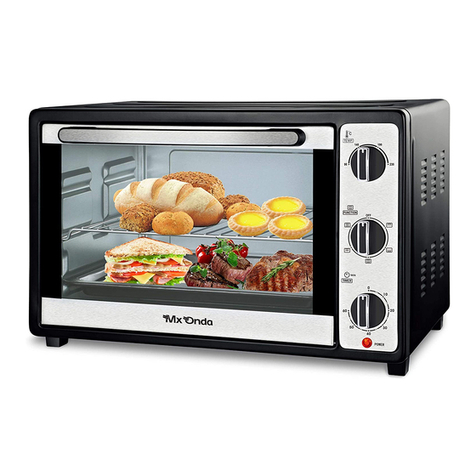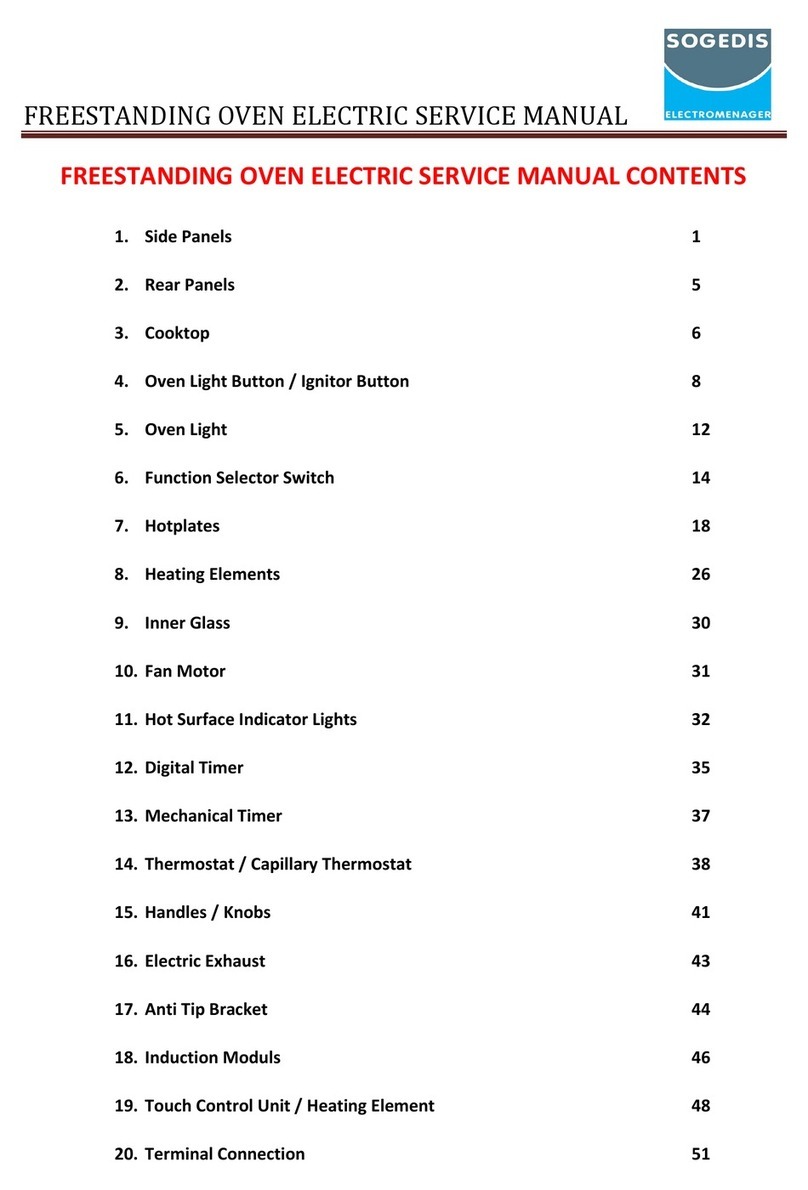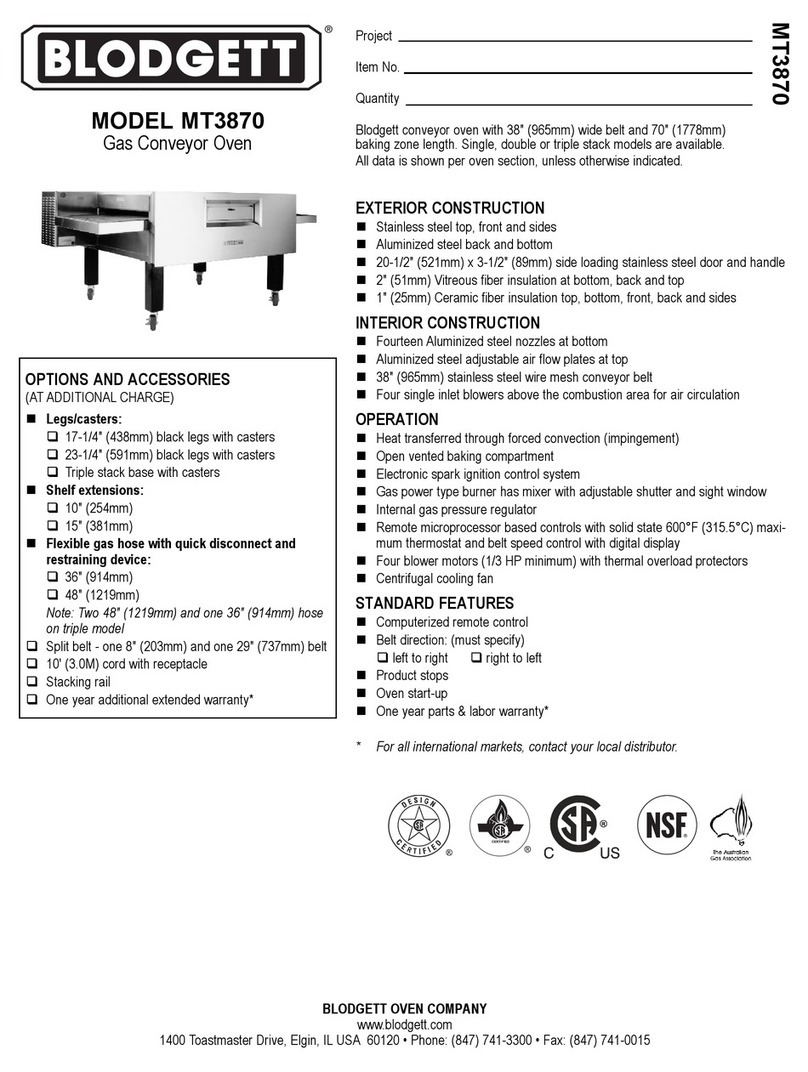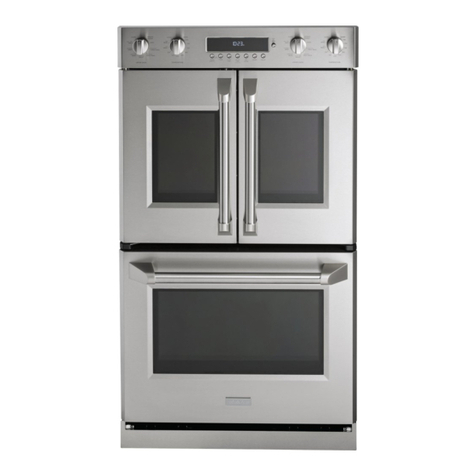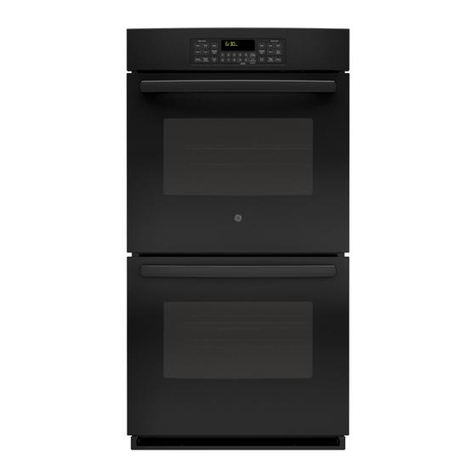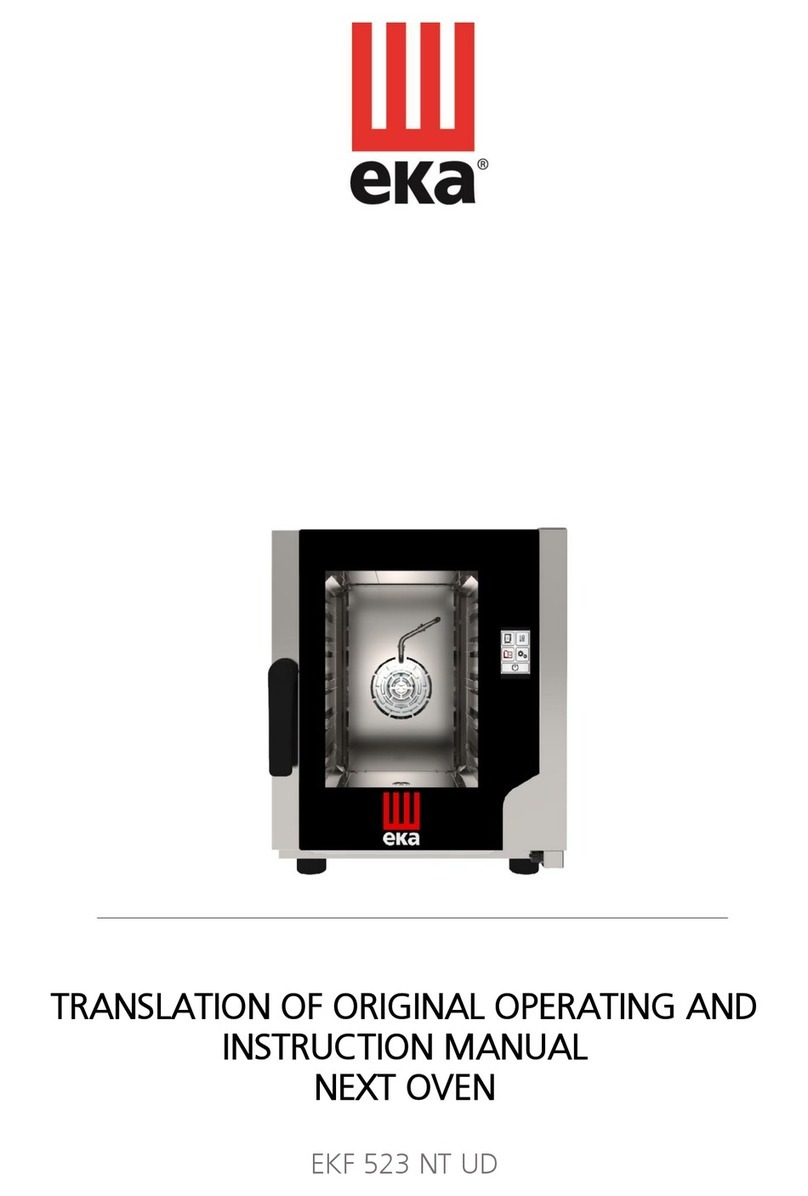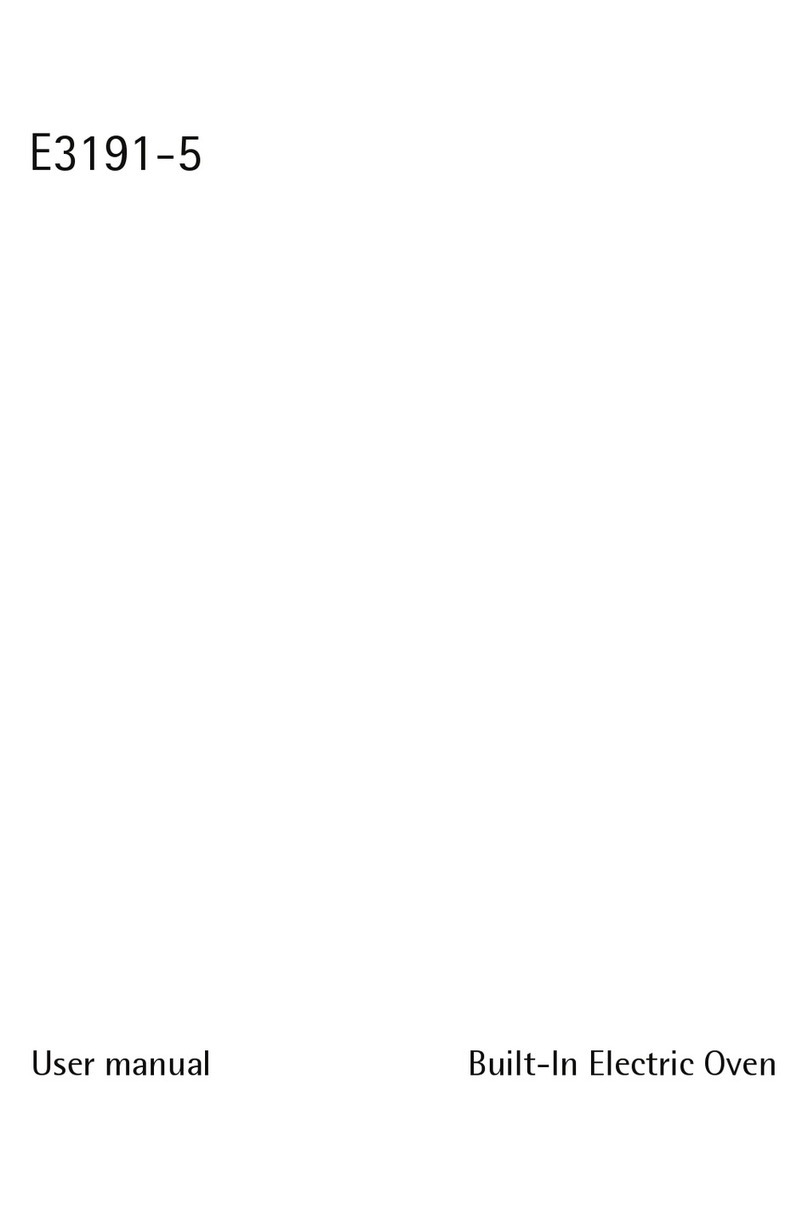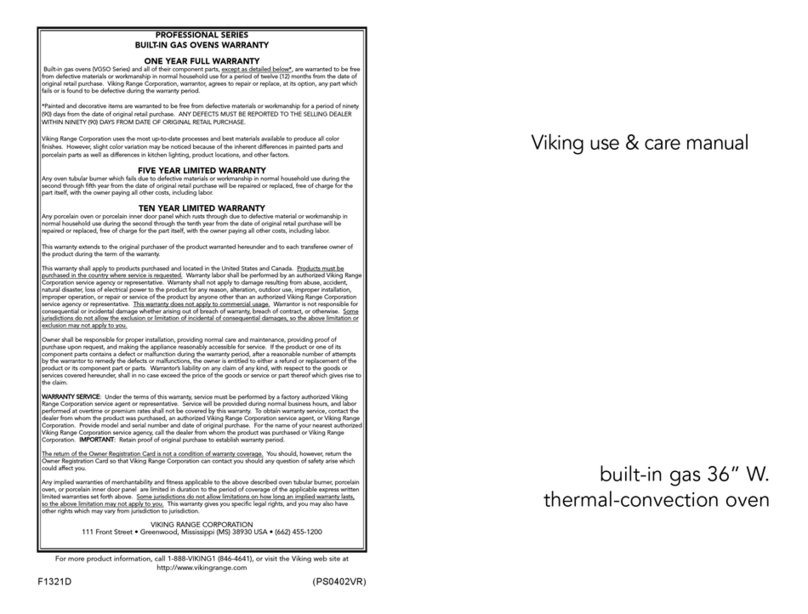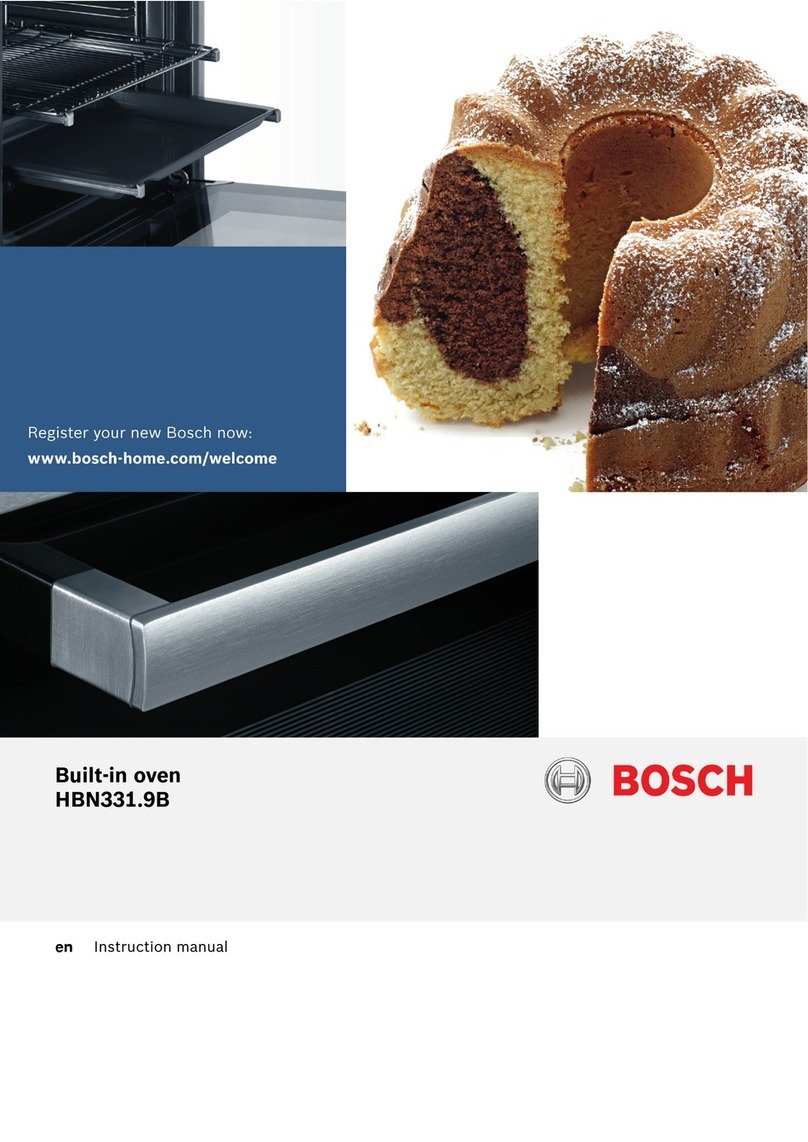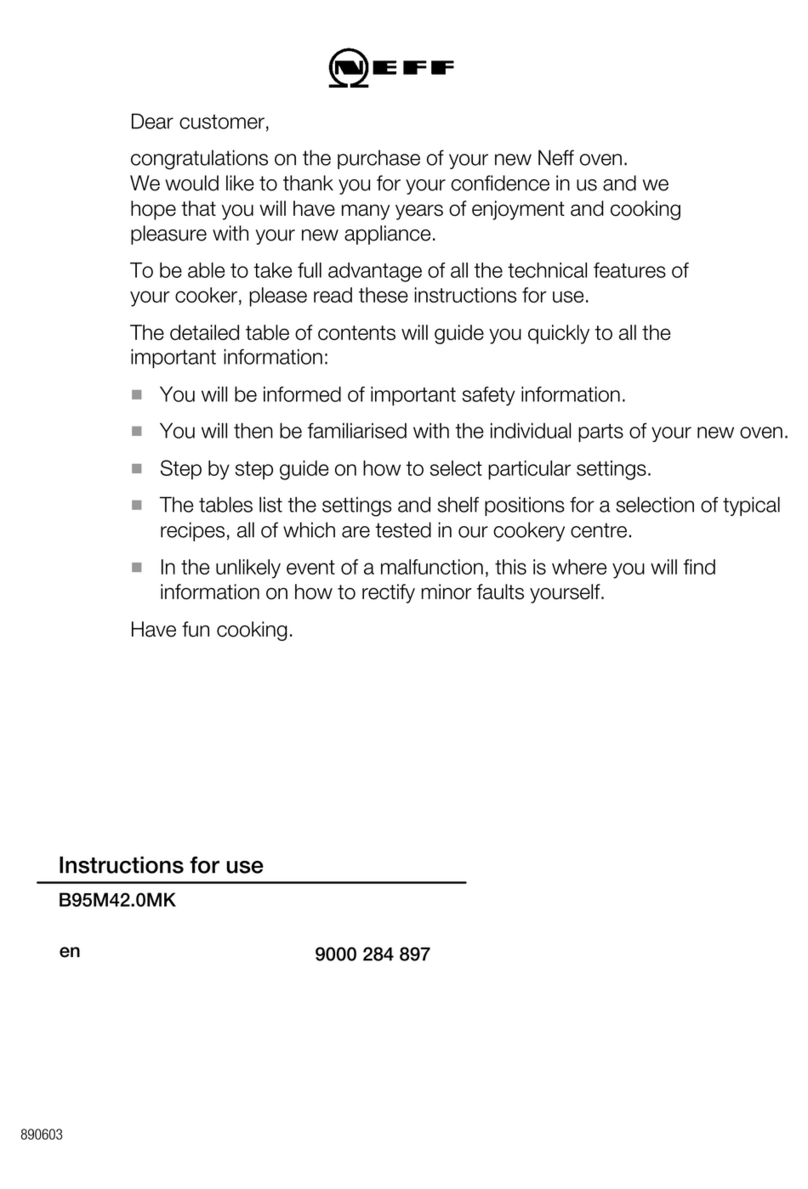Forno Bravo Casa80 User manual

Forno Bravo, LLC
Casa Modular Refractory Oven, Including:
Casa80 (SKUFVB80)
Casa90 (SKUFVB90)
Casa100 (SKUFVB100)
Casa110 (SKUFVB110)
Casa160 (SKUFVB160)
Installation and Operating Manual
A MAJOR CAUSE OF OVEN-RELATED FIRE IS FAILURE TO MAINTAIN REQUIRED
CLEARANCES (AIR SPACES) TO COMBUSTIBLE MATERIALS. IT IS OF UTMOST
IMPORTANCE THAT THIS OVEN BE INSTALLED ONLY IN ACCORDANCE WITH THESE
INSTRUCTIONS.
Forno Bravo, LLC
399 Business Park Court, #104
Windsor, CA 95492
(800) 407-5119
http://www.fornobravo.com
Tested to UL 737-07, UL Subject 2162-01, and NSF/ANSI 4-07.
Casa Installation and Operating Manual
© Forno Bravo, LLC 2008/9. All Rights Served. Ver. 2.1 1

WARNING
READ ALL INSTRUCTIONS BEFORE INSTALLING AND USING THE APPLIANCE. FAILURE TO FOLLOW
INSTRUCTIONS MAY RESULT IN PROPERTY DAMAGE, BODILY INJURY, OR EVEN DEATH.
When this oven is not properly installed, a fire may result. To reduce the risk of fire, follow the installation instructions. It is
essential to use only building and insulation materials designed for the purpose.
Use proper safety equipment when installing this oven, including gloves and professional breathing masks.
Contact your local building or fire officials for clarification on any restrictions on installation of this oven in your area,
or need for inspection of the oven installation.
HOT WHILE IN OPERATION. KEEP CHILDREN, CLOTHING AND FURNITURE AWAY. CONTACT MAY CAUSE SKIN
BURNS.
DO NOT BURN GARBAGE OR FLAMMABLE FLUIDS.
DO NOT CONNECT THIS UNIT TO A CHIMNEY FLUE SERVING ANOTHER APPLIANCE.
Keep children and pets away from hot oven.
Use firewood for burning only. DO NOT use charcoal, pressure treated lumber, chipped wood products, sappy wood such as
pine, laminated wood or any material other than dry medium or hard firewood.
DO NOT USE liquid fuel (firelighter fluid, gasoline, lantern oil, kerosene or similar liquids) to start or maintain a fire.
BEWARE of very high temperatures in the oven and use long oven gloves and mitts to handle pots and tools. DO NOT put
unprotected hands or arms inside oven while it is lit.
Dispose of ashes using a metal shovel and place in a metal bin with a tightly fitting lid. The container should be stored on a
non-combustible surface, away from all combustible materials. Ensure ashes are completely cold before disposing of them
appropriately.
BEWARE of flying sparks from mouth of oven. Ensure that no combustible materials are within range of oven at any time.
DO NOT close the oven door fully while a fire is in the oven. Closing the door fully will cut off oxygen to the fire, causing the fire
to erupt suddenly when the door is removed. Always keep door tilted to allow air to circulate in the oven.
DO NOT use water to dampen or extinguish fire in the oven.
DO NOT pack required air spaces with insulation or other materials.
When the curing of the refractories is not done as part of the manufacturing process, the manufacturer’s recommended curing
process shall be specified. Follow the instructions for curing the oven. Failure to follow the curing schedule can cause damage
to the oven, and void the oven warranty.
SAVE THESE INSTRUCTIONS
Casa Installation and Operating Manual
© Forno Bravo, LLC 2008/9. All Rights Served. Ver. 2.1 2

Limited Warranty
Forno Bravo, LLC Pizza Ovens and Fireplaces
THE WARRANTY
Forno Bravo, LLC, an importer and producer of pizza ovens and fireplaces, warrants it ovens and fireplaces (herein referred to
as Product) to be free from defects in materials and workmanship for a period of (1) one year from the date of shipment.
QUALIFICATIONS TO THE WARRANTY
The complete Product Warranty outlined above does not apply under the following circumstances:
(1) The Product was not installed in accordance with Forno Bravo installation instructions and local building codes.
(2) The Product is subjected to normal use including burning such natural Pizza Oven fuels as non-treated wood. Fuel
products with abnormal burning characteristics including, but not limited to, fuel such as driftwood, coal or plywood and wood
products using a binder, may burn at excessive temperatures and may cause damage to the Product or may cause it to
function improperly. Forno Bravo does not warrant the Product when such fuels have been used.
(3) This Warranty does not apply to normal wear and tear.
(4) This Warranty does not apply to any cracking caused by over-firing or the failure to follow a proper curing schedule.
(5) In the event that the Listing plate has been removed, altered or obliterated.
(6) On parts that would be normally worn or replaced under normal conditions.
(7) Normal cracking due to expansion and contraction stress relief in either the dome or floor blocks.
LIMITATION ON LIABILITY
It is expressly agreed and understood that Forno Bravo's sole obligation and purchaser's exclusive remedy under this
Warranty, under any other warranty, expressed or implied, otherwise, shall be limited to replacement, repair, or refund, as
specified above, and such liability shall not include, and purchaser specifically renounces any rights to recover, special,
incidental, consequential or other damages of any kind whatsoever, including, but not limited to, injuries to persons or damage
to property, loss of profits or anticipated profits, or loss of use of the product.
In no event shall Forno Bravo be responsible for any incidental or consequential damages caused by defects in its products,
whether such damage occurs or is discovered before or after replacement or repair, and whether or not such damage is
caused by Forno Bravo’s negligence. Some states do not allow the exclusion or limitation of incidental or consequential
damages, so the above limitation or exclusion may not apply to you. The duration of any implied warranty with respect to this
Product is limited to the duration of the foregoing warranty. Some states do not allow limitations on how long an implied
warranty lasts, so the above may not apply to you.
Casa Installation and Operating Manual
© Forno Bravo, LLC 2008/9. All Rights Served. Ver. 2.1 3

INVESTIGATION OF CLAIMS AGAINST WARRANTY
Forno Bravo reserves the right to investigate any and all claims against this Warranty and to decide upon method of
settlement.
DEALERS HAVE NO AUTHORITY TO ALTER THIS WARRANTY
Forno Bravo's employees and dealers have no authority to make any warranties nor to authorize any remedies in addition to or
inconsistent with those stated above.
HOW TO REGISTER A CLAIM AGAINST WARRANTY
In order for any claim under this Warranty to be valid, Forno Bravo must be notified of the claimed defect in writing or by
telephone to Forno Bravo, 399 Business Park Court, #506, Windsor, CA, 95492. Claims against this Warranty in writing should
include the date of installation, and a description of the defect.
Casa Installation and Operating Manual
© Forno Bravo, LLC 2008/9. All Rights Served. Ver. 2.1 4

Table of Contents
............................................................................................................................................Contained in the Crate 6
.....................................................................................................................................................Oven Clearances 8
....................................................................................................................................................Oven Dimensions 9
.......................................................................................................................................................Getting Started 12
.........................................................................................................................................................1. Foundation 14
.................................................................................................................................................2. The Oven Stand 17
........................................................................................................................................3. The Insulating Hearth 20
.......................................................................................................................................4. Set the Cooking Floor 23
.........................................................................................................................................6. Chimney Installation 26
...............................................................................................................................................7. Insulate the Oven 30
...................................................................................................................................8. Enclosure Design Styles 32
.................................................................................................................................................9. Igloo Enclosure 35
..........................................................................................................................................10. Walled Enclosures 37
............................................................................................................................................11. Curing Your Oven 39
.......................................................................................................................................12. Firing and Operation 40
.............................................................................................................................13. Maintenance and Cleaning 41
..........................................................................................................................................Appendix 1. Tools List 42
......................................................................................................................................Appendix 2. Material List 43
Casa Installation and Operating Manual
© Forno Bravo, LLC 2008/9. All Rights Served. Ver. 2.1 5

Contained in the Crate
One Forno Bravo Casa Pizza Oven kit, including:
Two-piece (Casa80, 90), four piece (Casa100, 110) or six
piece (Casa 160) oven dome;
Two-piece (Casa 80), four piece (Casa 90, 100, 110) or six
piece (Casa 160) cooking floor, plus vent landing;
Two-piece refractory vent system for use with either a
UL103HT steel chimney system or a terracotta flue liner;
Steel door;
Three-piece pizza oven tool set, including a rectangular
pizza peel, a round pizza peel and a copper brush;
50 sq. ft 1280ºC (2300ºF) ceramic insulating blanket.
(Note: the tool set is shipped in a separate box and may
arrive separately.)
Woven ceramic insulating blanket
Casa Installation and Operating Manual
© Forno Bravo, LLC 2008/9. All Rights Served. Ver. 2.1 6

Optional Equipment
Purchased separately or user supplied
See Appendix 2 for quantities.
•Additional dome insulation; either FB Blanket or loose
vermiculite;
•Refmix (or similar) refractory mortar
•FB Board ceramic insulating board
Simpson DuraTech UL103HT steel chimney system,
including:
•Anchor plate
Chimney pipe
•Spark arrester
•Brick arch
Casa Installation and Operating Manual
© Forno Bravo, LLC 2008/9. All Rights Served. Ver. 2.1 7

Oven Clearances
It is essential to maintain clearance space between the oven
components and any combustible material, such as walls and
ceilings. Failure to maintain these clearances can result in fire.
Combustible Wall Clearance
The oven must have a minimum 1" (25 mm) clearance to
combustibles from all sides, and 14" (356 mm) clearance
to combustibles from the top.
If building materials will contact the oven, they must be
completely noncombustible. Please note that standard
drywall (or sheet rock) is considered a combustible.
The area directly above the doorway and 6" (152 mm) to
each side of the doorway must be covered with non-
combustible material.
Non-combustible construction may contact the oven and
must then maintain 1" (25 mm) clearance to combustibles.
If the space between the legs of the stand is used for
wood storage, it is recommended that it be a covered
container or box to prevent the possibility of sparks or
embers from making contact with the stored wood. An
8-1/2" (eight and one-half inch) air space clearance is
required between the bottom of the oven and any wood
storage container.
Floor Hearth Extension
The minimum floor hearth extension areas from the oven
door opening to combustible floors are as follows:
•30” (762) to each side of the door opening
•36” (914 mm) in front of the door opening
The foundation should be at least 4” wider and deeper
than the hearth, to allow for trim material.
Casa Installation and Operating Manual
© Forno Bravo, LLC 2008/9. All Rights Served. Ver. 2.1 8

Oven Dimensions
Top Elevation
Oven
Exterior
Hearth
Width
Hearth
Depth
Casa80
35.4"W x 38.9"D”
50”
58”
Casa90
40.1"W x 43.6"D
54”
62”
Casa100
44.0"W x 48.7"D
58”
66”
Casa110
47.9"W x 51.1"D
62”
70”
Casa160
47.9"W x 70.7"D
62”
89”
These dimensions are based on 1” woven ceramic
insulation, 4” vermiculite insulation, 2” upper walls and a
12” oven landing. Adjust your dimensions according to
your specific installation. To minimize the oven footprint,
you can insulate the oven with 3” of woven ceramic
insulation, and minimize your oven landing.
Front Elevation
7 ½” hearth; 4” insulating concrete on top of 3 ½”
structural concrete.
Or, 4 ½” hearth; 2” FB Block ceramic insulating blocks on
top of 3 ½” structural concrete.
Cross Section: Igloo
Casa Installation and Operating Manual
© Forno Bravo, LLC 2008/9. All Rights Served. Ver. 2.1 9

Cross Section: Walled Enclosure
Corner Installation: Casa80 31” (internal)
Corner Installation: Casa90 35” (internal)
Corner Installation: Casa100 39” (internal)
Casa Installation and Operating Manual
© Forno Bravo, LLC 2008/9. All Rights Served. Ver. 2.1 10

Corner Installation: Casa110 43” (internal)
Casa Installation and Operating Manual
© Forno Bravo, LLC 2008/9. All Rights Served. Ver. 2.1 11

Getting Started
Your Casa oven is comprised of a number of basic
components, which we will define here to give you a better
understanding of the installation process.
1. The Foundation Slab
Your oven enclosure rests on a wire mesh reinforced 5
1/2" concrete slab. It can be a stand-alone slab built
specifically to support your oven, or it can be poured to
accommodate other outdoor kitchen items including
shelves, grills and tables. If you are in areas with deep
frost, you will want to ensure that your slab is properly
engineered to remain level during the winter freeze.
2. The Stand and Insulating Hearth
Your Casa dome and cooking surface are set on an
insulating hearth stand that you build on your foundation
slab. The hearth consists of a layer of structural concrete,
topped with insulation, such as FB Board ceramic fiber
insulating board.
The oven cooking floor should be set to a height where
you can easily place and remove food -- typically around
40 inches. The insulating hearth and the block stand are
the same width and depth.
The insulating hearth serves three purposes, providing
your oven with:
•A rigid platform that spans the opening between the
stand's legs above the wood storage area.
•An insulation layer to stop heat from escaping through
the rigid platform and down into the stand legs.
•A smooth surface on which the cooking surface will
rest.
3. The Cooking Surface and Vent Floor
The Casa oven provides a round cooking floor and the
floor under the vent. Pizza and bread are baked directly on
the Casa cooking surface, while other foods such as
vegetables and roasts are placed in cookware, or cooked
on a Tuscan style grill over wood coals.
Additionally, you may want to build an additional landing
area in front of the oven opening to provide a staging area
for food that is being placed inside or removed from the
oven.
The Casa cooking floor is centered left and right on the
hearth slab, with the oven dome resting around it – directly
on the insulating layer. Placement of the front edge of the
oven floor depends on the depth of the oven landing,
where the front of the oven butts up to the landing
material.
4. The Oven Dome
The Casa dome shape is designed to efficiently absorb
heat from a wood fire, and to evenly reflect the heat of a
live fire to the cooking surface – where it both heats the
cooking floor and food. The oven is assembled using
Forno Bravo Refmix, a high heat mortar.
5. Ventilation
Unlike a fireplace, where the chimney is inside the firebox
in the back, the brick oven's vent and chimney are outside
of the oven -- in the front. The Casa vent assembly is
designed for use with either round steel chimney pipe or a
refractory clay flue liner.
The type of chimney pipe you use depends on whether
your installation is outside or inside, your design choice,
and on your local building code. Be sure to check your
local building code prior to installation. You must use a
chimney cap to minimize rainfall infiltration into your
chimney and oven, and to stop sparks from leaving the
chimney.
Casa Installation and Operating Manual
© Forno Bravo, LLC 2008/9. All Rights Served. Ver. 2.1 12

6. Arch and Door
Your Casa oven has two openings: one into the oven itself,
and a second, opening around the oven vent and landing.
The Casa oven includes a freestanding steel door that fits
tightly against the oven opening.
7. Dome Insulation
After the Casa dome and vent have been assembled, the
oven is covered with woven ceramic insulation, The Casa
oven includes one FB Blanket with provides roughly 1” of
coverage, and requires additional insulation from either
additional FB Blankets, or loose insulation, such as
vermiculite or perlite. Unlike thermal mass, where too
much can be a bad thing, there isn't really such a thing as
too much insulation. Woven ceramic insulation has the
advantages of higher efficiency, requiring using less
space, and providing better oven heat retention.
8. Oven Enclosure
There are two basic outdoor oven designs: the Walled
House and the Igloo, both of which give you a virtually
limitless range of design options and finish materials.
Oven structures can be designed to incorporate a range of
outdoor kitchen elements, such as counters, shelves,
storage, and grills.
Never use wood, or any other combustible material to
frame your oven enclosure.
The top half of the Gabled House can be constructed
using either metal studs and concrete board, or half-wide
concrete blocks (4"x8"x16").
The Igloo is constructed using rebar, wire stucco lathe
(mesh), rough stucco (scratch coat), and/or exterior finish
stucco. The finish material must be waterproof.
The lower half of outdoor ovens that use a metal stand
can be finished with metal studs and concrete board, and
both the metal and concrete block stand can be finished to
match to top of the oven.
Indoor ovens can be placed in corners, against walls, and
when the oven is part of a larger re-modeling project, can
be set back outside a room to make the front of the oven
flush with an interior wall. Indoor ovens can easily be set
behind a partition wall constructed from metal studs and
concrete board.
9. Finish
Finish materials typically include stucco, brick, stone, tile,
marble, travertine, and granite.
Casa Installation and Operating Manual
© Forno Bravo, LLC 2008/9. All Rights Served. Ver. 2.1 13

1. Foundation
Overview
Your oven stand and oven chamber are installed on a
concrete pad. We recommend a minimum thickness of 5
½inches (14 cm) for the Foundation slab, however your
location, soil conditions and local building ordinances will
dictate the thickness required.
The slab dimensions listed below are 8 " wider than the
dimensions of your concrete block stand, providing you
with 2" for finish material, and a 2" reveal on either side of
the stand. The slab is also 10" deep, allowing for 4" in the
back (2" finish and reveal), and 6" in front (the additional
space makes a nice edge for your wood storage). The
foundation slab will also be used to support forms that you
will use during the hearth slab construction The finished
top of the slab should be 2"-3" above ground level.
Instructions
First, excavate your foundation. The slab frame for a 5
½"(14 cm) foundation is best composed of 2x6 inch
lumber set so the top of the form is 2-3” (5-8 cm) above
ground level. The longer form boards should sit inside the
shorter boards, and the completed form can be held in
place by driving wooden stakes into the ground around the
perimeter. Before securing everything permanently, check
to make sure the form is located and faces exactly where
you want it, and is level and square.
1.1. Use a tiller to break up the soil.
Lay a 3" base of pea gravel (or crushed rock), compact the
rock, and cover it with a layer of 6 ml plastic sheeting to
stop the slab from wicking water.
1.2. A gravel or crushed rock bed.
Place a sheet of wire mesh inside the foundation frame,
and install a two-piece grid using 1/2" rebar (#4) set 4" and
8" inside the foundation frame. Tie the rebar together with
tie wire, then set the wire mesh and rebar half way up the
pad (2 3/4"), using either rebar stand-offs or fragments of
brick.
Casa Installation and Operating Manual
© Forno Bravo, LLC 2008/9. All Rights Served. Ver. 2.1 14

1.3. Framed, lined, with wire mesh and rebar.
Mix and pour the concrete, and then level it. Use a 2"x4"
to screed and level the concrete, then finish to a
smoothness that works for you as the bottom of your wood
storage area. Allow the slab to cure for a day or two.
Keeping it damp will help it cure better and become
stronger.
1.4. Using a mixer.
1.5. The finished foundation ready to cure.
Other Considerations
Depending on where you live, you may have to excavate
18” or more, of topsoil to reach a stable substrate such as
hard clay. If you do excavate to a depth greater than the
foundation form height, you will need to add a material,
such as thoroughly compacted pea gravel or crushed rock,
which will allow for the drainage of water from under the
concrete slab. Placing a layer of plastic sheeting over the
material will help prevent it from wicking water from the
slab too quickly, making it brittle and prone to cracking.
You may also want to install your Casa oven as part of a
larger outdoor kitchen project. Use the dimensions for the
oven in conjunction with your other kitchen elements, such
as counters, a grill, storage, a sink, and refrigeration. You
might find it easier to form your entire kitchen at one time.
Casa Installation and Operating Manual
© Forno Bravo, LLC 2008/9. All Rights Served. Ver. 2.1 15

1.6. A complete outdoor kitchen foundation.
1.7 The foundation and first course of stand blocks.
Hints and Tips
Use a tiller to break up the ground before you excavate.
You can rent one from Home Depot. If your ground is hard
and/or dry, water it with a sprinkler for a couple of days
before you start. Your site should be soft, but not muddy.
Compare both diagonal measurements of your foundation
frame to ensure that your foundation will be square.
Double check that your foundation really faces the exact
direction you want your oven to face. Once the diagonals
are of equal length, you may want to temporarily attach
2”x4” lumber horizontally to form triangles at the corners
and hold your form square during the pour.
1.8. 2”x4” studs hold the form square and plumb.
The weight of concrete in the foundation can be heavy (40
80 lb. bags or more), and mixing it by hand in a
wheelbarrow might use up energy and time that will serve
you better later in the project. Rent a mixer from Home
Depot, and ask a friend (or pay a local teenager) to help
you mix and pour the slab.
There are also mix-on-your-site trucks that come and just
make as much concrete as you need on site, so you might
want to price this option if available in your area.
Check with your local equipment rental company for a 1-
yard mixer that you can tow behind a standard pickup
truck.
If your building site is far from your street or curb, you can
hire a concrete pump to shoot the concrete where you
want it. The pump rental is typically a different company
from the concrete delivery truck.
Remember that while the slab has to be square, level,
plumb, and structurally sound to get your oven off on the
right foot, it will never be seen. It is worth saving your best
finish work for later in the project.
Casa Installation and Operating Manual
© Forno Bravo, LLC 2008/9. All Rights Served. Ver. 2.1 16

2. The Oven Stand
Overview
The oven stand is typically constructed using standard (8’
x 8” x 16” and 8” x 8” x 8”) concrete blocks, though it can
also be made from brick or metal.
Instructions
Build a block stand comprised of four courses using
standard 8"x16"x8" and 8"x8"x8" concrete blocks. The first
three courses of the block stand form a three-sided U,
leaving an opening in the oven front that provides access
for wood storage. The fourth course of blocks spans the
opening at the front of the U, by resting on two pieces of
2"x2"x3/8" angle iron.
Using a chalk line, mark the layout of your block stand
directly on the foundation slab. Make sure that it faces
exactly where you want your oven opening to face. Then,
lay your first course of blocks directly on your slab. Use
pre-mixed mortar where necessary to ensure that the first
course of blocks is level, front and back, side to side, and
on the diagonals.
Take your time with getting the first course set correctly,
because it will be increasingly difficult to correct problems
later.
2.1. Carefully lay out the first course of blocks.
In the following courses, stagger your blocks using either
8"x8"X8" blocks, or cut blocks, to ensure that the joints are
offset. Lay the next two courses, for a total of three.
After you have laid your first three courses, set your two
pieces of 2"x2" angle iron across the opening between the
two legs of the U shape. Note that the back piece of angle
iron must be cut to allow clearance for the rest of the top
course of blocks.
2.2. Cut the back angle iron to leave room for blocks.
Grind, or cut, 3/8" from the edges of each block that rests
on the angle iron, so that they lie flush with the rest of the
fourth course. Finish laying the rest of the fourth course of
blocks.
Casa Installation and Operating Manual
© Forno Bravo, LLC 2008/9. All Rights Served. Ver. 2.1 17

2.3. The finished stand.
After you have completely assembled the block stand,
check that the walls are square, level and plumb. Drop a
section of 1/2" rebar in every other core, and fill those
cores with concrete.
Variations
Variations include round stands, corner ovens, oven with
an attached outdoor kitchen, pre-cast lintels, and metal
stands.
2.4. A corner installation.
2.5. Custom metal stand with stud frame.
2.6. Stand with cast lintels.
Tips and Hints
When selecting the direction your oven will face, consider
making sure that your opening does not face possible
winds, which might disrupt your cooking and fire
management.
We also recommend dry stacking your blocks, then filling
every other core (or the corners) with concrete. It's a lot
faster, and sturdier as well.
Block the cores that you have not filled with your empty
concrete bag to stop your hearth concrete from spilling
into the holes.
Casa Installation and Operating Manual
© Forno Bravo, LLC 2008/9. All Rights Served. Ver. 2.1 18

2.6. Filling the cores.
Casa Installation and Operating Manual
© Forno Bravo, LLC 2008/9. All Rights Served. Ver. 2.1 19

3. The Insulating Hearth
Overview
Your oven sits on a two-piece hearth, comprised of an
insulating layer that rests on top of a structural layer. We
recommend using FB Board for under oven insulation, as
it is easy to install and very efficient at holding heat inside
your Casa oven. If you are using FB Board, pour a rebar
reinforced 3 ½” pad using a 2”x4” form, and place the FB
Board on top of the pad.
If you are using vermiculite concrete for insulation, you
pour the hearth in two parts: a 3 1/2" layer of structural,
rebar reinforced standard concrete, followed by a 4" layer
of insulating concrete, using a 2”x8” form.
Instructions
The hearth form is built in two parts: a bottom tray and the
frame sides, which will hold the hearth as it is poured.
After the hearth has cured, the form is removed (and
usually becomes part of the first fires that will cure your
oven).
Bottom Form Support
First, using 2"x4" lumber build the frame for the bottom of
the form. The frame should be roughly 3/8" smaller than
the opening of your block stand, so that it can be easily
removed after the hearth has cured.
Next, cut (12) lengths of 2"x4" that will serve as the legs
that hold the bottom frame in place inside the stand
opening. You will use 1/4" shims to accurately set the top
of the frame. The top of the 2”x4” frame should be about
1" below the top of the stand (to allow for the 3/4" plywood
and shims). Measure and cut your 2”x4” legs accordingly
-- stand height, minus 2 1/2" (1 1/2" for the 2”x4” and 1" for
the plywood and shim).
3.1. The form ready for the tray.
Set two 2”x4" legs at each corner and one in the middle of
the span, then lay the frame on top. Place shims between
the legs and frame, and then tap the shims to raise the
frame up until its top is 11/16" (the true thickness of 3/4"
plywood) from the top of the stand. After the bottom tray is
built, you will add more 2“x4” legs to support the center of
the tray.
Casa Installation and Operating Manual
© Forno Bravo, LLC 2008/9. All Rights Served. Ver. 2.1 20
This manual suits for next models
9
Table of contents
Other Forno Bravo Oven manuals

Forno Bravo
Forno Bravo Primavera60 (SKUFP60) Installation and operating instructions

Forno Bravo
Forno Bravo Toscana80 User manual

Forno Bravo
Forno Bravo Primavera 60-W-FA User manual

Forno Bravo
Forno Bravo Artigiano80 User manual
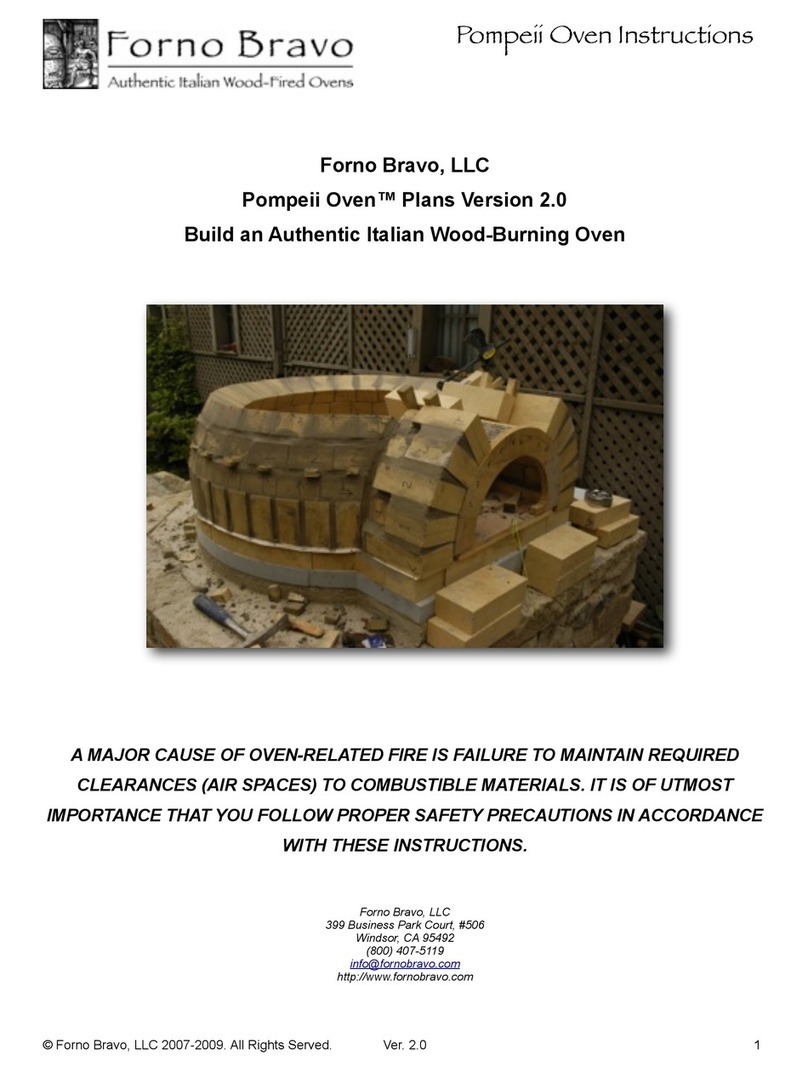
Forno Bravo
Forno Bravo Pompeii Oven User manual

Forno Bravo
Forno Bravo Giardino60 User manual

Forno Bravo
Forno Bravo Casa2G Series User manual
Popular Oven manuals by other brands

Brandt
Brandt FC 222 user manual
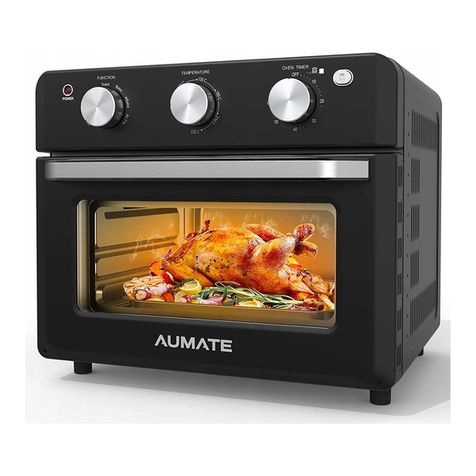
aumate
aumate TOA20M04N-1E instruction manual
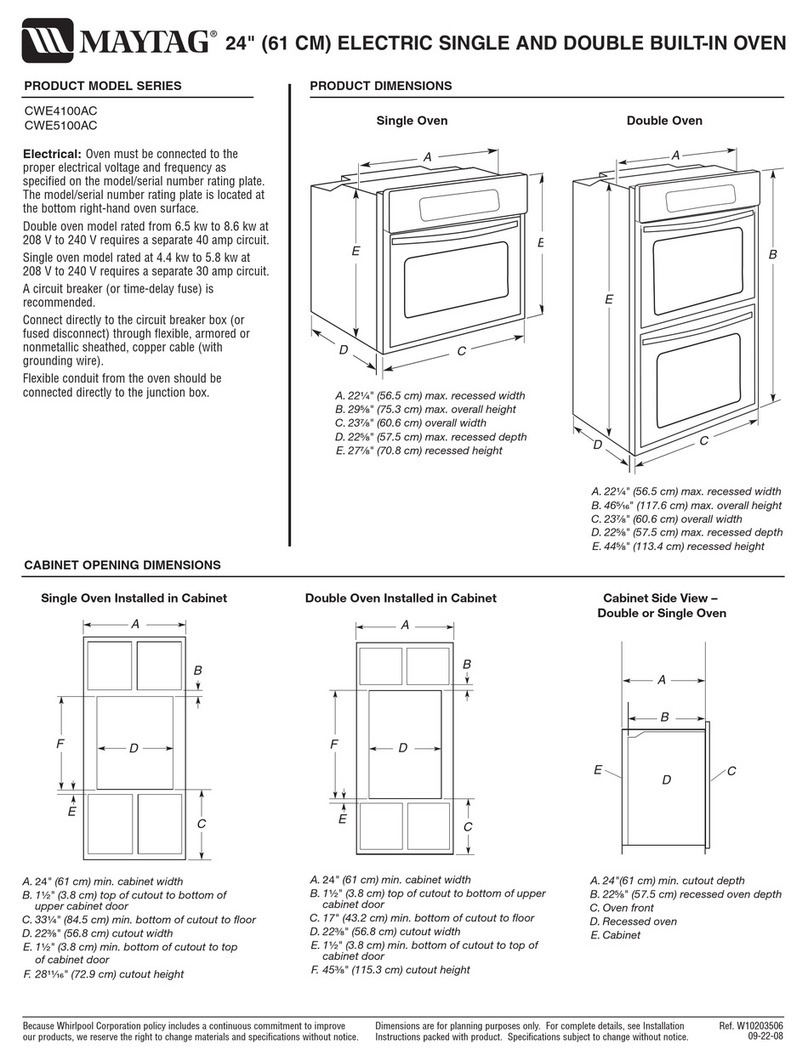
Maytag
Maytag CWE4100AC - 24" Single Electric Wall Oven Dimension Guide
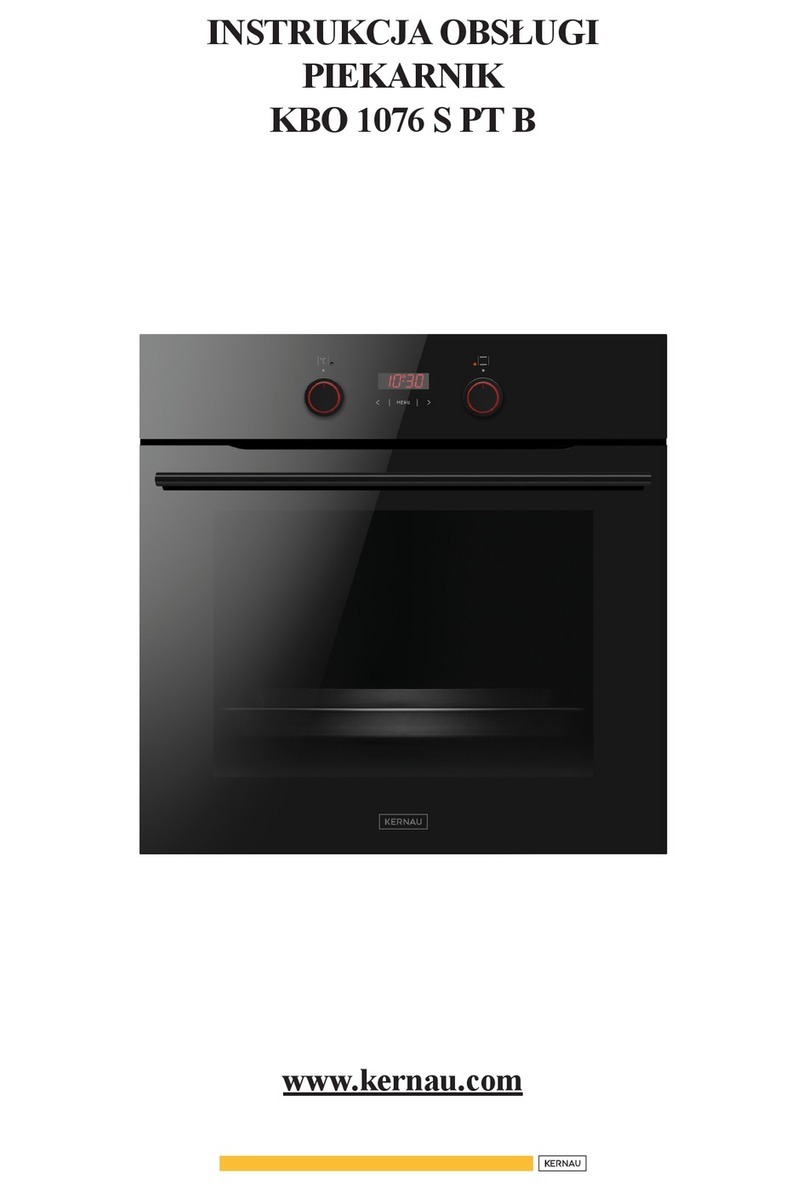
Kernau
Kernau KBO 1076 S PT B instruction manual

Bosch
Bosch HB 37 N Series User manual and installation instructions

Electrolux
Electrolux EOD5420AA user manual
